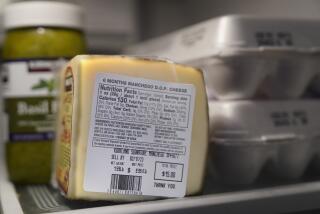Administration Wins Approval of Produce Seal
- Share via
SACRAMENTO — The Deukmejian Administration, seeking to calm public fears about toxic chemicals in the food supply, has quietly won legislative approval of a plan to let farmers use a state “quality and safety” seal on produce, including fruits and vegetables treated with pesticides.
The program, which has been widely criticized by consumer groups as misleading, was approved after the Administration used a quirk in the Legislature’s rules to bypass public hearings and normal legislative procedures, opponents of the program revealed Monday.
Developed at the urging of growers and retailers, the program will allow farmers who pay a small fee to proclaim the state’s endorsement of their produce by attaching a label that reads: “California Department of Food and Agriculture--Quality and Safety.”
Sen. William Campbell (R-Hacienda Heights), who serves as chairman of the Joint Legislative Budget Committee, quietly authorized the program last Thursday when he approved a request from the Department of Food and Agriculture to fund the program until the end of the fiscal year on June 30.
“We have the authority to start today,” confirmed Daniel Haley, chief deputy director of the Department of Food and Agriculture.
However, Haley said, the department does not expect to begin the program until an Assembly budget subcommittee agrees to include the plan in next year’s budget. On Monday, the program won approval from a Senate budget subcommittee, the first step in incorporating it into next year’s spending plan.
Critics of the program, including Consumers Union, the Planning and Conservation League, and Assemblyman Gerald N. Felando (R-San Pedro), have charged that it is simply a promotional effort designed to mislead consumers.
The program includes no plan to reduce the amount of pesticides and other chemicals used on fruits and vegetables or to curb the use of specific chemicals known to cause cancer, they said.
“The program is little more than a public relations effort developed by and for the benefit of the agricultural industry,” Planning and Conservation League attorney Corey Brown said in a letter of protest to Campbell. “Its major purpose is to mislead consumers into believing the state’s pesticide regulatory program is adequate.”
The program’s opponents also criticized the Administration for developing the program in “secret,” denying them a chance to negotiate over the design of the program and then obtaining approval without a legislative hearing.
To obtain legislative approval, the department submitted a request for $100,000 to fund the program during the remainder of the fiscal year--a procedure generally used when an existing state program has run out of money. As chairman of the Joint Legislative Budget Committee, Campbell is authorized to approve such requests without taking them to the full committee.
“It shakes my confidence in the process,” said Assemblyman Lloyd G. Connelly (D-Sacramento), a leader on toxics issues. “My immediate concern is that a very controversial program received legislative approval through the signature of one state senator. That’s not right.”
Advocates of the labeling program, including such organizations as the Western Growers Assn., said state action is needed to shore up the public’s faith in the safety of the food they buy. Recent publicity about Alar, the growth-inducing chemical sprayed on red apples, has reduced consumers’ confidence in produce treated with chemicals, industry leaders said.
In exchange for the right to use the California label, growers will agree to abide by the state’s existing toxics laws. Money collected from the small fee charged will be used to test for chemical residues on an additional 2,500 food samples annually.
Initially, the Department of Food and Agriculture had proposed language on the label that would have guaranteed the safety of the produce: “Quality and Safety Assured,” the seal would have read. But after consulting with attorneys, the department dropped the word “assured” from the label because of concern it would increase the state’s liability if food bearing the seal caused illnesses.
In addition to the labeling program, agriculture interests are sponsoring legislation that they say is needed to restore consumers’ faith in California produce. Among its provisions, the bill by Assemblyman Bruce Bronzan (D-Fresno) would require the state to begin testing chemical levels in processed food for the first time and focus testing on specific pesticides considered most hazardous.
However Connelly, who is contemplating sponsoring a sweeping food safety initiative in 1990, said the Bronzan measure would do nothing to curb the use of dangerous chemicals. “It’s so weak it’s meaningless, and possibly harmful,” he said.
More to Read
Get the L.A. Times Politics newsletter
Deeply reported insights into legislation, politics and policy from Sacramento, Washington and beyond. In your inbox twice per week.
You may occasionally receive promotional content from the Los Angeles Times.










